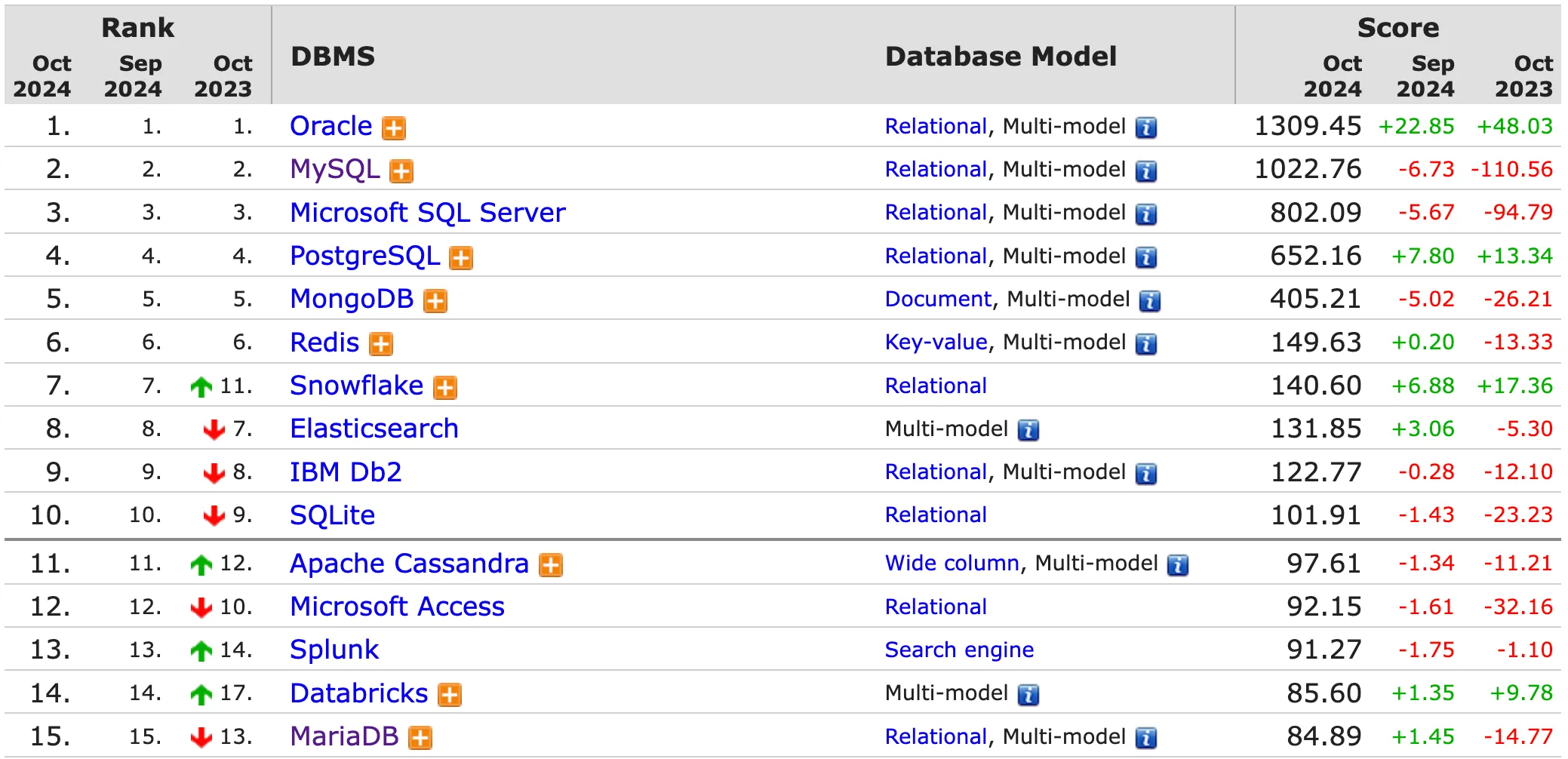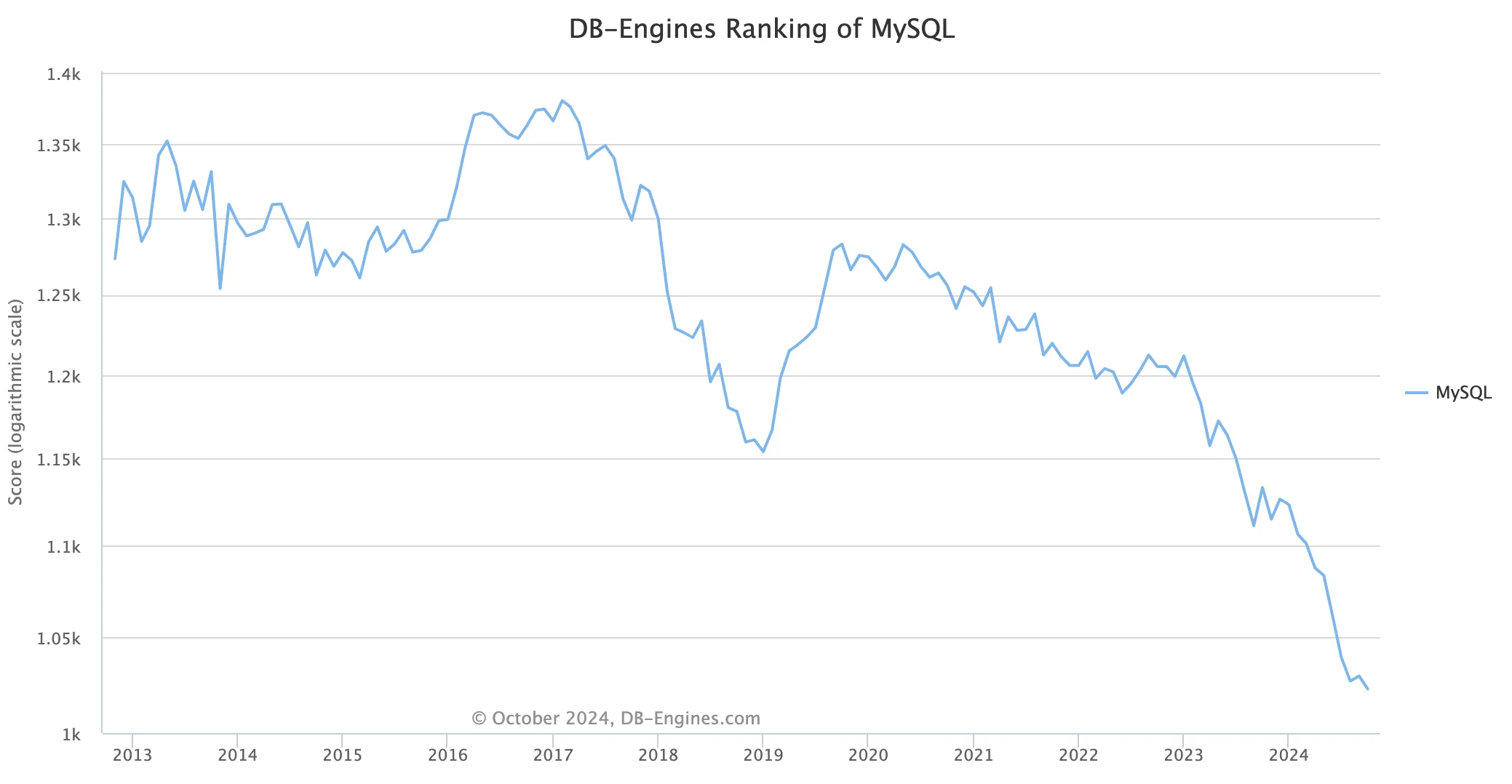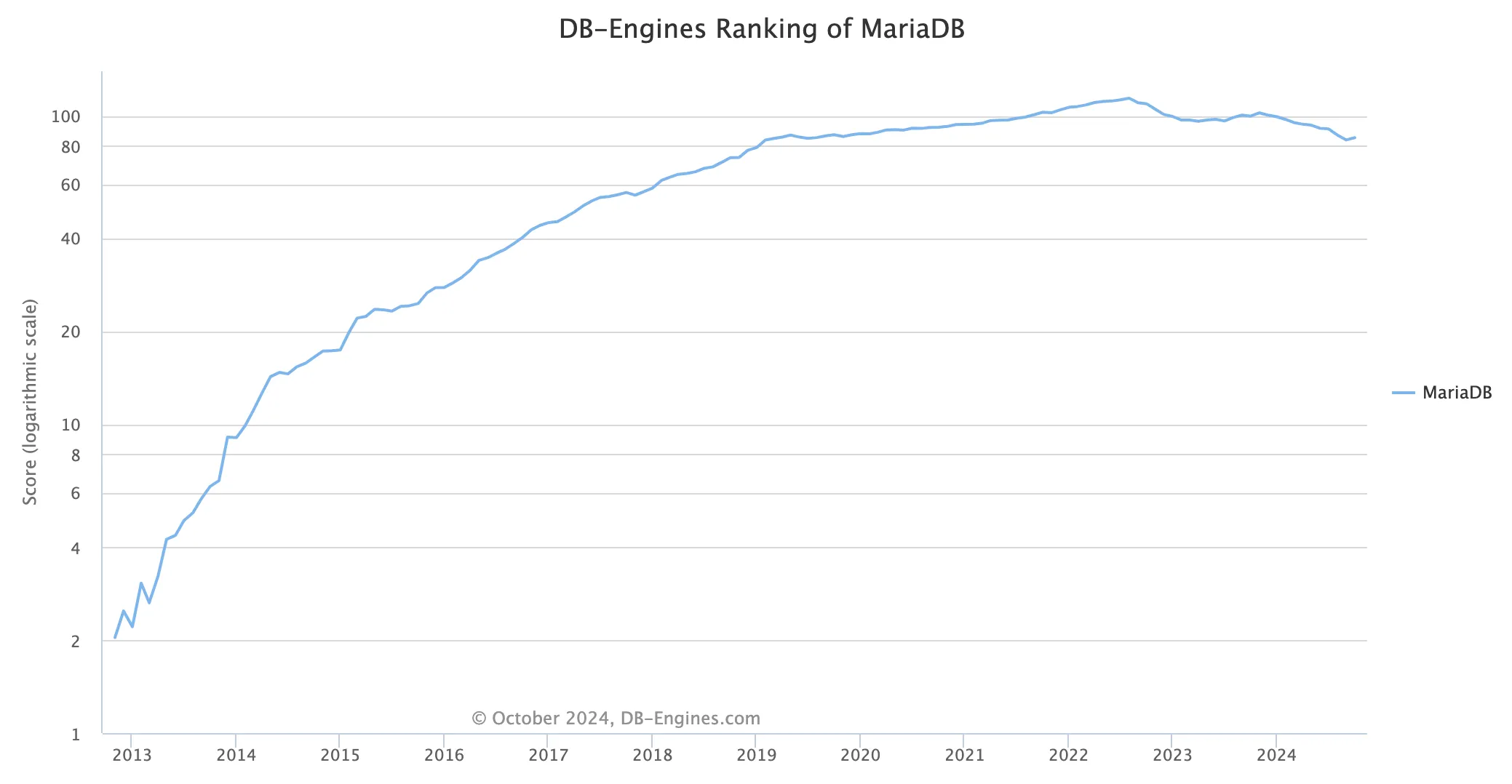Here at DoltHub, like MariaDB and Oracle, we’re in the MySQL business. We built a MySQL-compatible database, Dolt, that has all the version control features you know and love from Git. We made the decision to be MySQL-compatible back in 2019 when MySQL was riding high as the most popular open source SQL format. Oh, how times have changed? Some five years later, I’m penning an article asking whether MySQL is dying.
Postgres seems to have all the momentum as a SQL format. As MySQL proprietors, we can feel this. Often, the first words out of potential users’ mouths is “I wish this was Postgres”. We felt it so much that mid-2023, we decided to build Doltgres, our Postgres-flavored version of Dolt. Doltgres will be Beta in Q1 2025.
Is MySQL dying? Let’s examine the evidence.
What do you mean by “MySQL Dying”?#
When I say MySQL, I mean the MySQL database format, any database you access with a MySQL client using the MySQL-variant of SQL. Can you SHOW DATABASES or SHOW TABLES? You’re in MySQL format.
Databases that implement the MySQL format form a large MySQL ecosystem. The MySQL ecosystem includes:
- Vanilla MySQL, now owned by Oracle
- MySQL Heatwave
- MariaDB
- AWS RDS, MySQL/MariaDB
- AWS Aurora, MySQL/MariaDB
- Planetscale, including Vitess
- Dolt
How vibrant is this ecosystem? Are the companies in it doing well? Are new systems being built on top of these databases? Are existing solutions migrating to these databases? Are the companies that own these databases investing in new features for MySQL users?
DB Engines#
Obviously, plenty of people still run MySQL in production. MySQL was the first popular, widely adopted open source SQL database. DBEngines, built by Redgate, is a website that tries to rank various database’s popularity. Their method is rather opaque and does not measure actual installs but it’s a good starting point.
At first glance, MySQL seems to be sitting pretty, with MySQL at #2 and MariaDB at #15.
“The reports of my death are greatly exaggerated.” -
Mark TwainMySQL
However, digging a little deeper, we can see some cracks in the dam. MySQL peaked in popularity in 2017, falling in popularity since then. The slump is especially exaggerated since the start of 2023.
MariaDB looks a little better but also shows interest starting to decline in 2023.
Let’s dig a little deeper into recent events to confirm or deny this decrease in popularity reported by DBEngines methodology.
MariaDB PLC Goes Private#
MariaDB stewardship is divided between the “not for profit” MariaDB Foundation and the “for profit” MariaDB PLC. Recently MariaDB PLC was taken private at a massive discount to their initial valuation when they went public via special purpose acquisition company (SPAC) in late 2022. At initial offering the company was valued at $445 million. The company was acquired for $37 million on August 26, 2024.
This massive decrease in valuation does not bode well for MariaDB’s commercial prospects. This news is what prompted me to write this article.
Counterpoint#
As a counterpoint, the MariaDB Foundation seems to be doing well. It recently signed AWS as its first diamond sponsor. Potentially, AWS is better at hosting MySQL and MariaDB than Oracle and MariaDB itself. Hosting databases is the primary avenue for open source databases to monetize. AWS may be the best at monetizing the MySQL ecosystem, hence the large donation to the MariaDB foundation. This leads to my next point.
Oracle Cloud Does not Host Vanilla MySQL#
Hosted Dolt recently launched support for a MySQL primary. In my research on MySQL Hosting providers, I noticed Oracle does not run a vanilla hosted MySQL in Oracle Cloud. If you want Hosted MySQL in Oracle cloud, you must run the closed source MySQL Heatwave.
This suggests to me that Oracle is not very excited about the open source version of MySQL. Again, like MariaDB, AWS might be better at monetizing MySQL than Oracle is. If the owner of the platform is not very excited about the core open source product, why should its users be excited?
Counterpoint#
MySQL Heatwave does exist. The performance characteristics are very impressive. Oracle is investing in the MySQL ecosystem. The investment is in the closed source, MySQL Heatwave.
MySQL is behind on Vectors#
The hot hotness in databases right now is vectors. Vectors are stored as multi-dimensional floating point arrays and allow for “Approximate Nearest Neighbor” searches. Vectors are hot right now because of Retrieval Augmented Generation (RAG), a technique for improving the usefulness of Large Language Models (LLMs) without retraining them. Anything related to generative artificial intelligence is hot by association right now.
pgvector is the Postgres vector plugin and is the defacto answer for vector support in a SQL database. Until recently, no MySQL answer to vectors existed. pgvector has a multi-year head start in the vector space.
Counterpoint#
MariaDB just launched Vector support in preview in July 2024, defining the MySQL syntax for vectors. Dolt will have version controlled vector support in Q4 2024. No other ecosystem offers a version controlled database, let alone version controlled vectors.
New Database Offerings Choose Postgres#
Following on the last point, it’s not just vectors, most of the innovation in SQL databases comes in the world of Postgres. You have Neon, Timescale, CockroachDB, and Supabase leading the way innovating for the Postgres ecosystem. The list of companies innovating in the MySQL ecosystem is much shorter.
Counterpoint#
DoltHub and Planetscale are the companies innovating in the MySQL ecosystem. Dolt is the only production-ready version controlled SQL database and it’s MySQL-compatible. However, Doltgres, the Postgres version of Dolt is in Alpha and going Beta in Q1 2025. Soon, Dolt will not differentiate the MySQL ecosystem.
Verdict: Postgres is Winning#
I think all the evidence suggests that Postgres has overtaken MySQL as the preferred open source SQL format. In the past couple of years, this trend has accelerated, driven by MariaDB’s disappointing monetization efforts, Oracle’s general lack of interest in MySQL, and Postgres’ leading vector support. These factors have led many start up companies to innovate on top of Postgres further strengthening its popularity. This has created a virtuous cycle for Postgres that I don’t see stopping any time soon.
But MySQL isn’t dying. MySQL has a wide install base. If software was built between 2005 and 2015, there’s a good chance it uses or at least supports MySQL. Like IBM DB2, MySQL is here to stay.
Anything I missed? Do you want to stan for MySQL? Come by our Discord and let’s chat.



